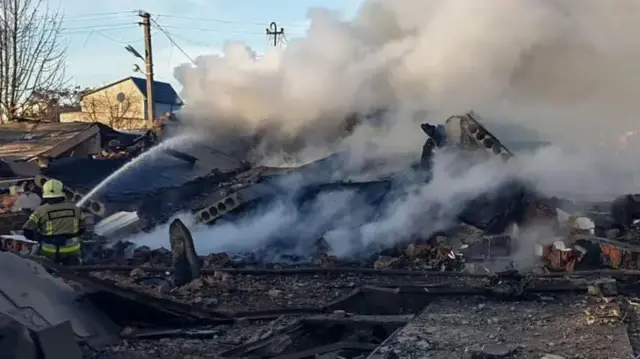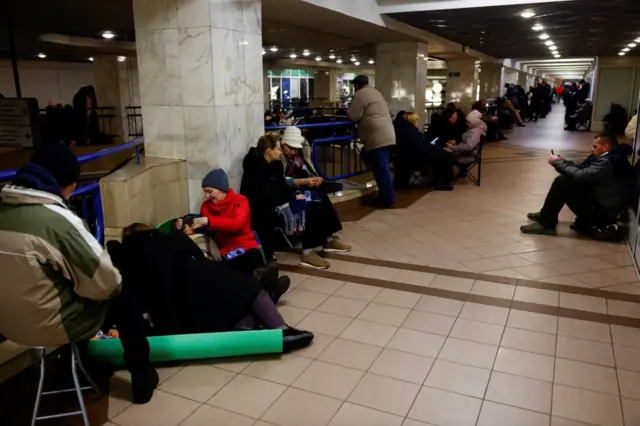On the night of November 28, Russia launched a large-scale attack on Ukraine's energy infrastructure, using two waves of Kalibr cruise missiles from the Black Sea and X-101 missiles launched from Tu-95MS strategic bombers. The attacks were accompanied by the massive use of Shahed kamikaze drones.
Due to the threat of strikes on the energy sector, Ukrenergo is turning off the lights in Kyiv and a number of regions. The Russians attacked a number of energy facilities, there are train delays.
Information is being received about destruction in various regions, in particular Kyiv, Rivne, Kharkiv, Vinnytsia, Sumy, Odesa and Strya near Lviv.
The routes of both waves of strikes were similar and mainly the rockets hit the center and west of the country.
As the Air Force reported, around 5 o'clock in the morning, Russia launched Calibers from the Black Sea, and Tu-95MS launched X-101 missiles. Due to the missile threat, the alarm was announced throughout Ukraine after 5 am.
Russian drones attacked the central regions since the evening and entered Kyiv from various directions.
In the first wave, Ukraine was attacked by "Calibres" - near Rivne, Lviv, Lutsk and other cities. And after 7 in the morning, new waves of rockets from the Tu-95MS arrived.
The second wave of missiles from Tu-95MS - Kyiv, Stryi, Rivne, Lutsk
The rockets of the second wave of the attack began to enter from Chernihiv Oblast and headed for Kyiv and Poltava Oblast.
Some of the missiles came from the Kherson region, the Air Force reported.
According to monitoring channels, there were about 25 missiles in the airspace of Ukraine. They first attacked the Poltava, Cherkasy and Mykolaiv regions.
Around 8 in the morning, an explosion rang out in Kyiv . The Kyiv City Military Administration announced that air defense is working. Later, the authorities reported that the fragments of the rocket fell on an open area in the Dnipro district of the capital.
Later, KMVA added that debris also fell on the territory of the enterprise in Darnytskyi district, there was no fire. Several outbuildings and a truck were damaged.

Photo author, Ministry of Defense of the Russian Federation
After that, most of the rockets turned west.
Soon the mayor of Lutsk Ihor Polishchuk announced the arrivals. According to him, a part of the city is out of power, electric transport is not working.
After 8 a.m., explosions rang out in Ivano-Frankivsk region, Rivne region and Khmelnytskyi region, local authorities reported.
over Rivne , local publications write.
"More than 280,000 subscribers are without electricity in the region. There are water outages. The schools of Rivne and parts of the Rivne district are being transferred to distance learning," Oleksandr Koval, head of the Rivne region, told about the first consequences.
In the Lviv region, the Russians again attacked Stryi - the Air Force and the authorities reported the strike on it during both waves of strikes.
"The enemy attacked energy infrastructure facilities", - the head of the region Maksym Kozytsky briefly described the consequences. Later, he clarified that due to the morning shelling and the use of hourly power cut schedules in Lviv Oblast, 523,000 subscribers were left without electricity.
It is known that there are underground gas storage facilities in Stryi, and Ukraine has repeatedly asked Western countries to help cover them, because EU countries also use them.
In Vinnytsia, as a result of a Russian missile attack, residential buildings were damaged, an outbuilding was destroyed, and a woman was injured. Natalya Zabolotna, the first deputy head of OVA, reported this.
She did not specify in which city of the region the Russians struck, but the missiles flew several times near Vinnytsia itself, the Air Force wrote.
The head of the President's Office, Andriy Yermak, commented on the massive strike on energy.
"The Russians continue their terror tactics. They were stockpiling missiles for attacks on Ukrainian infrastructure, for war with civilians during cold weather, during the winter," he wrote on his Telegram channel.
The last massive missile attack on Ukraine was on the morning of November 17, when significant damage was done to energy, and people were killed.
On November 21, Russia also used a new Oreshnyk ballistic missile against Ukraine.
The first wave of impact - Calibers hit energy
The first "Caliber" missiles first entered Odesa, Kirovohrad region and Cherkasy region and headed towards Kyiv. There were reports of explosions in Odesa and Kropyvnytskyi.
After 6 a.m., the mayor of Kharkiv, Ihor Terekhov, announced a rocket attack on Kharkiv. At least three strikes were recorded in the Kyiv district of the city.
Subsequently, part of the rockets headed through Vinnytsia and Zhytomyr regions to the west of Ukraine.

Author of the photo, DSNS
The Air Force reported rockets near Ternopil, Rivne, Lutsk, and Lviv, as well as an attack on Stryi.
Local media reported the explosions in Rivne and Lutsk. The head of the Lviv region, Maksym Kozytskyi, reported on the attack on Stryi.
Its head, Ivan Rudnytskyi, informed about the arrivals on the territory of the Volyn region.
In Sumy region, the Russians hit the infrastructure of the Shostky community with rockets - there were three explosions, the regional administration said.
As a result of the rocket attack, six residential private buildings in Odesa district , one person was injured.
The government of the Kirovohrad region also announced a massive attack on energy. "The enemy hit Kirovohrad region with missiles and drones. At the place of the explosions, the relevant services put out the fire. There are no victims," said the statement of the head of the region Andriy Rajkovych.
After the first wave of Calibers, monitoring channels reported that several waves of Kh-101 cruise missiles launched from the Tu-95MS were expected.
A blow to Ukraine's energy sector
Against the background of Ukrenergo's statement about the emergency power outage due to the threat of a Russian attack, the head of the Ministry of Energy Herman Galushchenko announced an attack on the energy sector.
"Once again, the energy industry is under a massive attack by the enemy. Attacks on energy facilities are taking place all over Ukraine. The operator of the transmission system of NEC Ukrenergo has urgently introduced an emergency power cut," Galushchenko said.
After the November 17 attack, blackout schedules were already in effect in Ukraine.

Photo credit: Reuters
"All over the country there are massive shellings, point blackouts, but more than 150 Ukrzaliznytsia trains are going according to schedule, the traffic situation is stable and under control," Ukrzaliznytsia reported.
They said that there are delays of a little more than 1 hour for six trains due to the blackout of certain sections.
"We will gradually reduce the backlog."

